Within the context of russia’s war against Ukraine, some media speak wrongly about bringing russia to justice for “military crimes.” This term is categorically incorrect. Rather, it is correct to speak of the responsibility for WAR crimes because there is a crucial difference between these two crime types.
Based on Regional Center for Human Rights contributions, VoxCheck explains the difference between war crimes and military crimes, and the war crimes Russia will be punished for.
How is a military crime different from a war crime?
According to Art. 401-435 of the Criminal Code (CC) of Ukraine, a military crime is an offense against procedures regulating military service committed by service members, persons subject to military service, and reservists during a call-up. In other words, a military crime is when a service member disobeys orders, defies superiors, violates the chain of command, is absent without leave, or deserts. As of 2018, Ukraine’s Criminal Code uses “military criminal offense” instead of “military crime.”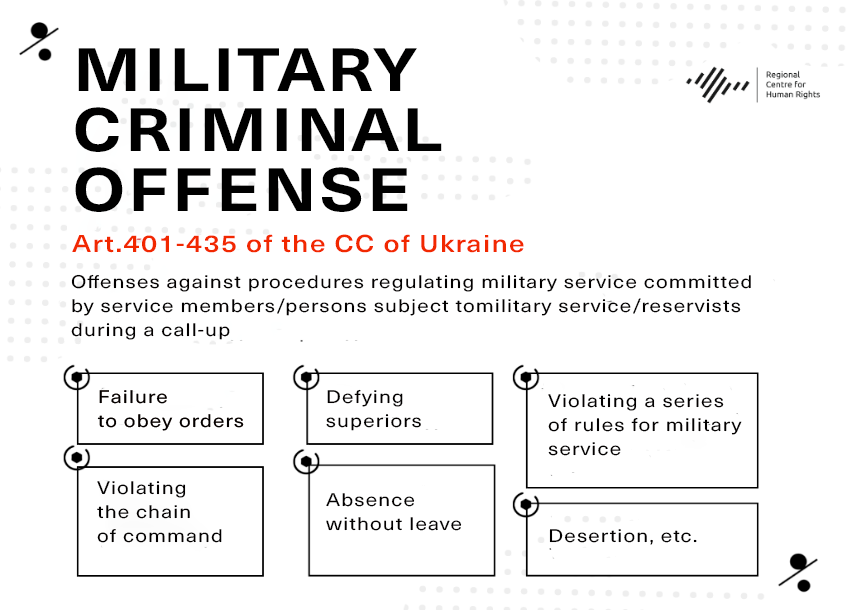
Infographics by Regional Center for Human Rights
A war crime is a serious violation of the laws or customs of war. These include murders (other than a combatant killing another combatant) and torture in conditions of armed conflict, destruction or appropriation of property not justified by military necessity, conscription in the occupied territories, unlawful transfer of civilians, attacks on civilian objects, etc. In the Rome Statute of the International Criminal Court (ICC), war crimes come alongside genocide, aggression, and crimes against humanity.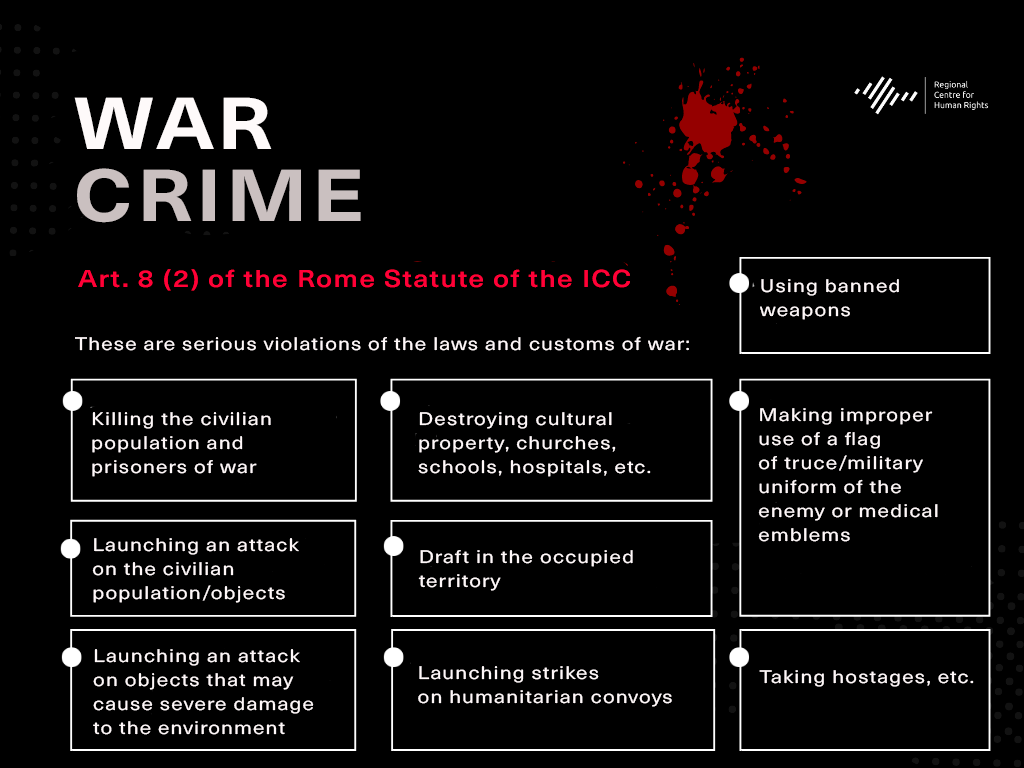
Infographics by Regional Center for Human Rights
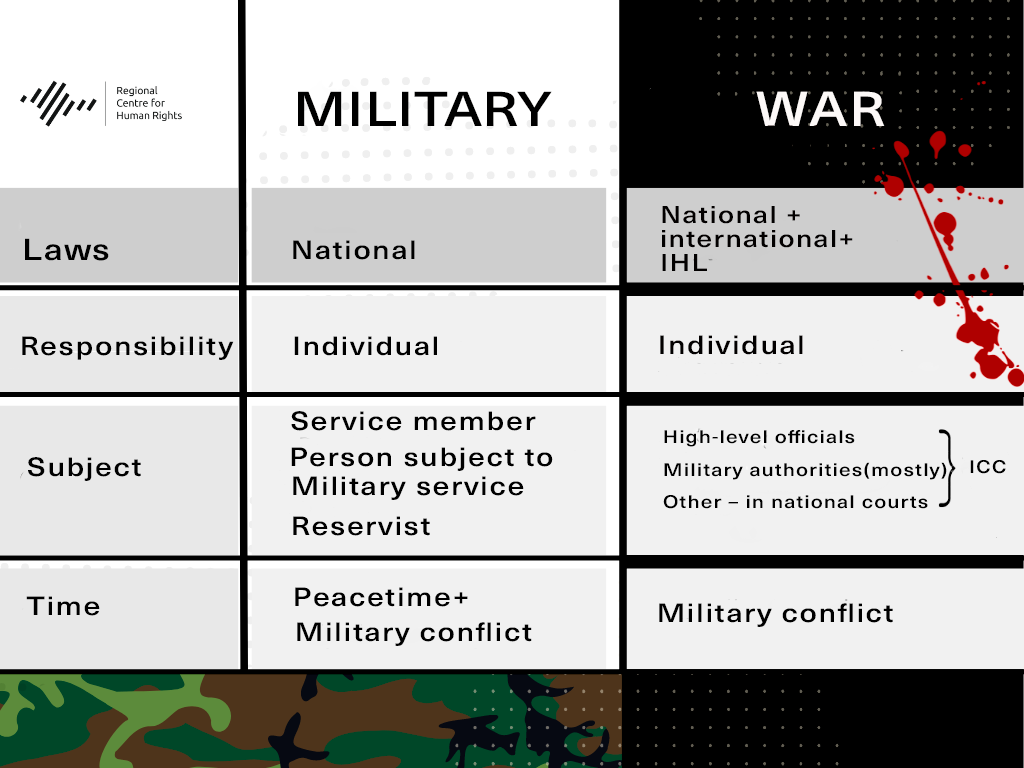
Infographics by Regional Center for Human Rights
An important difference between military crimes and war crimes is that war crimes can be committed only in conditions of and in connection with an armed conflict. Instead, military criminal offenses can occur both during armed conflict and during military service in peacetime.
In both cases, it is individual responsibility for the crime. However, with a military crime, the subject is military personnel, while with a war crime, it is high-ranking officials or military authorities.
Therefore, russia as a state will not be held accountable for war crimes, but its officials and other participants in the conflict will be because of individual responsibility. A country may be held to account for committing an international offense within other jurisdictions (in the form of satisfaction, restitution, compensation).
What war crimes has russia been committing against Ukraine?
Murder of civilians
Russian occupiers have repeatedly killed civilians, which can be deemed as acts of genocide of the Ukrainian people. For instance, civilians standing in line for bread were killed in Chernihiv around 10 a.m. on March 16. The estimated death toll reached 14. Russian shells hit a high-rise residential building and fell near the store.
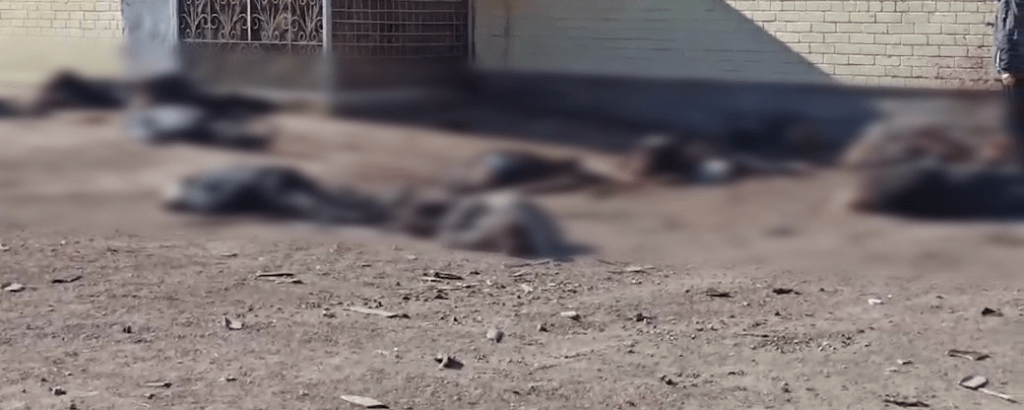
Source: UA:PBC
On the same day, russian aircraft purposefully bombed the Drama Theater in the center of Mariupol. Hundreds of civilians, including children, were hiding in the theater building. The Russian occupiers knew in advance that there were children in the theater. Maxar Technologies’ satellite images showed the word “Children” painted in large letters on the pavement and visible from the sky. Despite this, the plane dropped a bomb on the building. It destroyed the theater’s central part, blocking the entrance to the bomb shelter within the building. Over 1,000 people remain trapped under the rubble.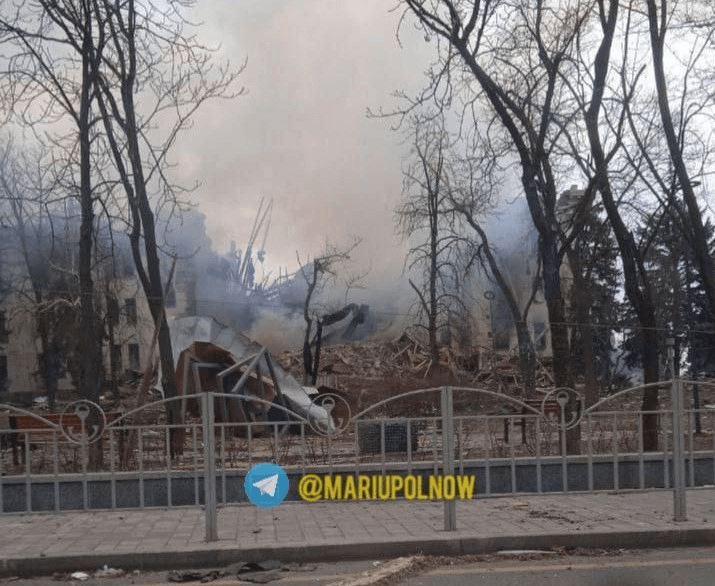
Source: Mariupol Now Telegram channel
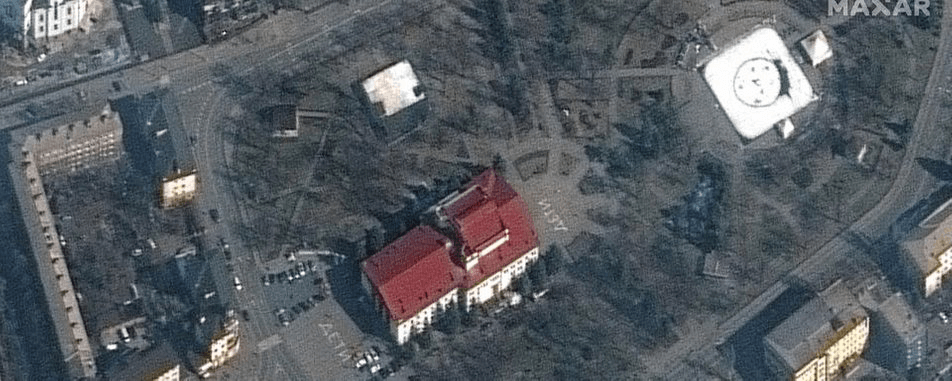
Russian occupiers also launched a strike on a maternity hospital in Mariupol. As a result, the hospital was destroyed. The attack injured 17 people and killed one woman and her unborn child.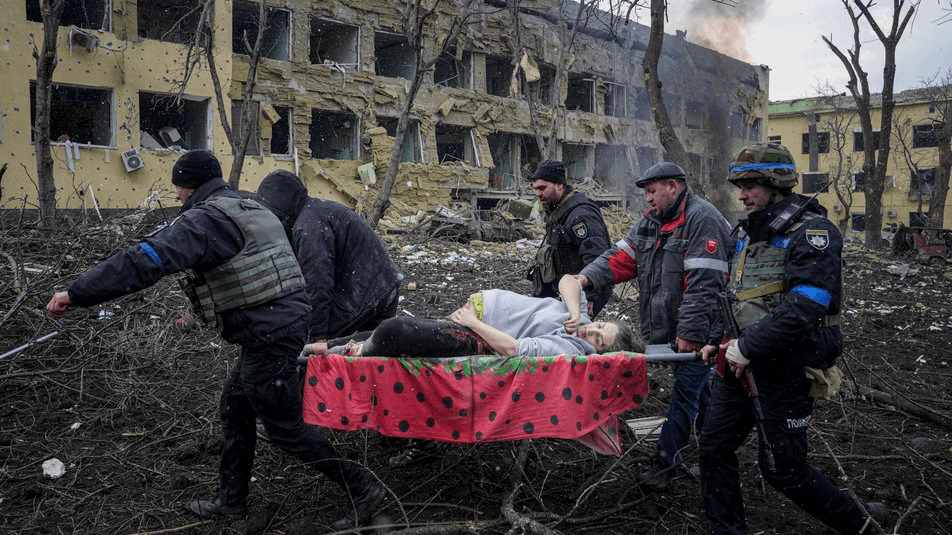
Source: UA:PBC
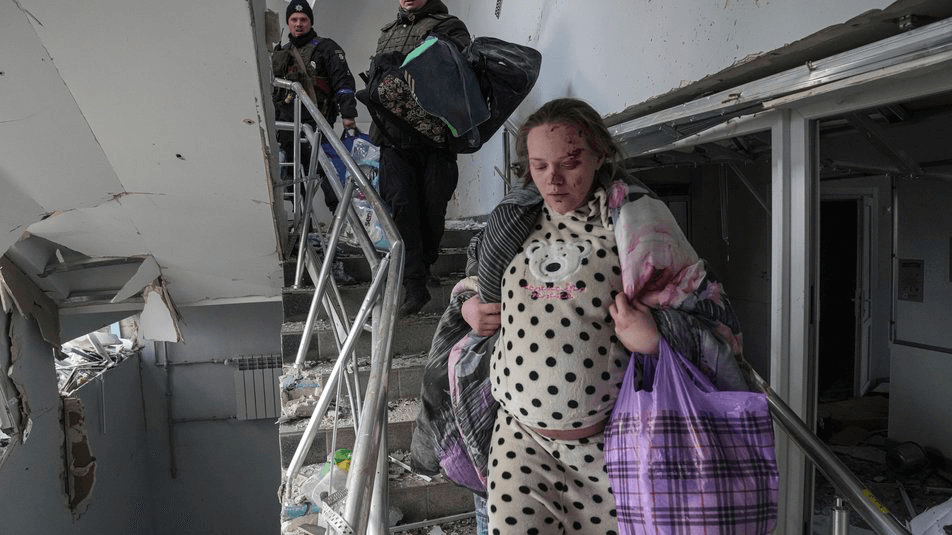
Source: UA:PBC

Regional Department of Pathologies in Newborn and Premature Infants
Source: UA:PBC
Using prohibited weapons
On March 14, a group from the State Emergency Service of Ukraine (SES) in Mykolayiv seized ten explosive devices, including eight cluster munitions. The principles of international humanitarian law governing the conduct of hostilities prohibit the use of cluster munitions in human settlements.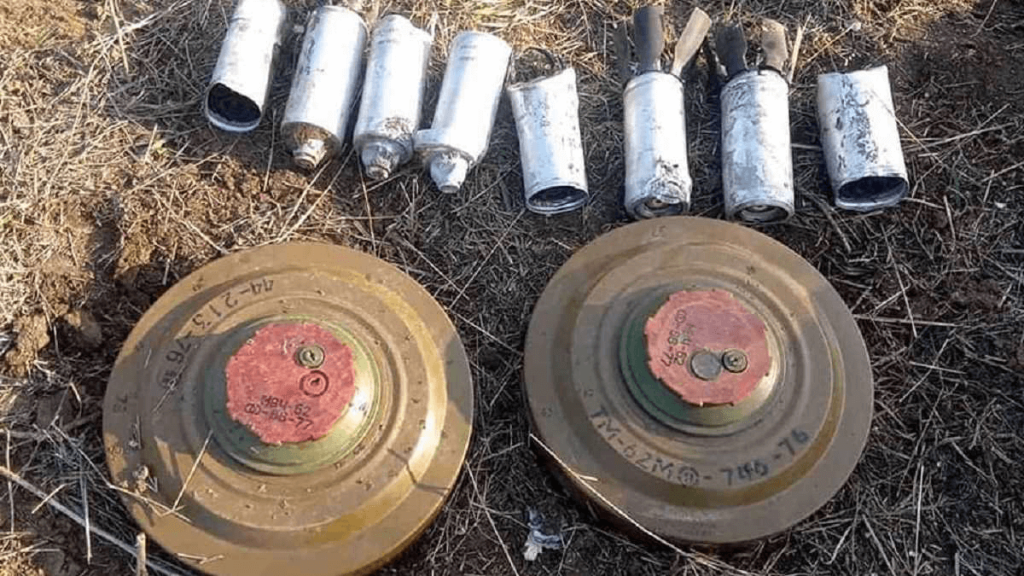
Source: SES’s Telegram channel
The UN has confirmed more cases of russia’s use of cluster bombs. For instance, on February 24, cluster munitions exploded at the Central City Hospital in Vuhledar. The blast killed four civilians and injured ten others. It also damaged ambulances, civilian cars, and the hospital itself.
Read also: “The Geneva Conventions: How Russia breaches them and blames Ukraine for it. VoxCheck explains.”
Several districts of Kharkiv were also shelled with cluster munitions, killing nine civilians and wounding 37.
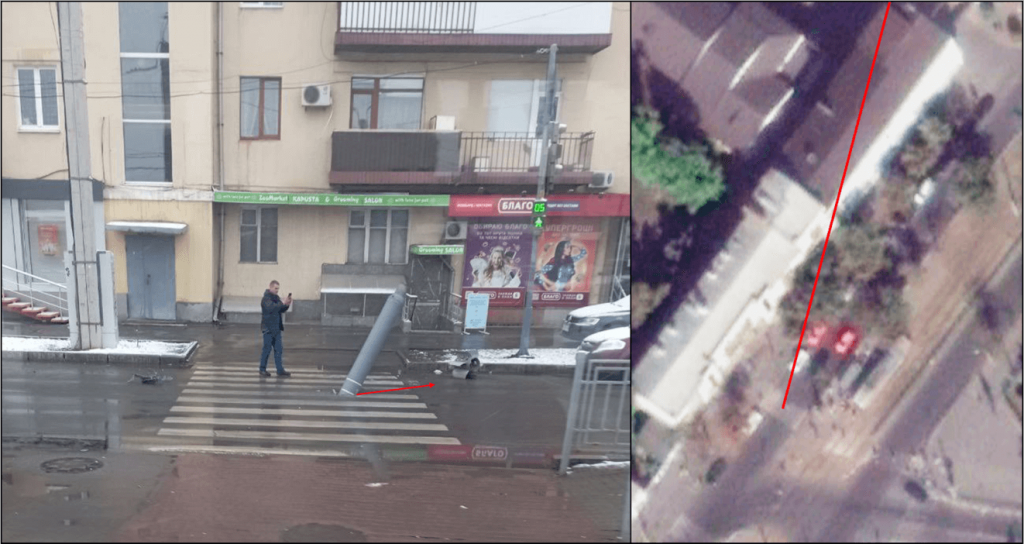
Besides cluster munitions, russian occupiers have used other types of prohibited weaponry. According to Serhiy Haidai, head of the regional state administration, and Oleksiy Biloshitskyi, first deputy head of the Department of Patrol Police of Ukraine, Russia used phosphate munitions to shell the village of Popasna in the Luhansk region.
Conflict Intelligence Team experts later said it had most likely been incendiary missiles launched from “Grads.” Protocol III annexed to the Convention on Prohibitions or Restrictions on the Use of Certain Conventional Weapons Which May Be Deemed to Be Excessively Injurious or to Have Indiscriminate Effects bans incendiary munitions.
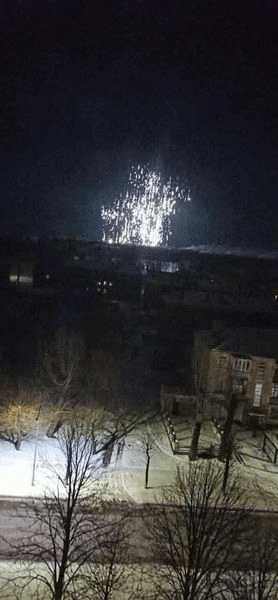
Attacking objects that pose a significant threat to the environment
Since the beginning of the military invasion of Ukraine, russian occupiers have seized Ukrainian nuclear power plants. The Russians attacked the Chernobyl nuclear power plant and established control over it and the Chornobyl Exclusion Zone.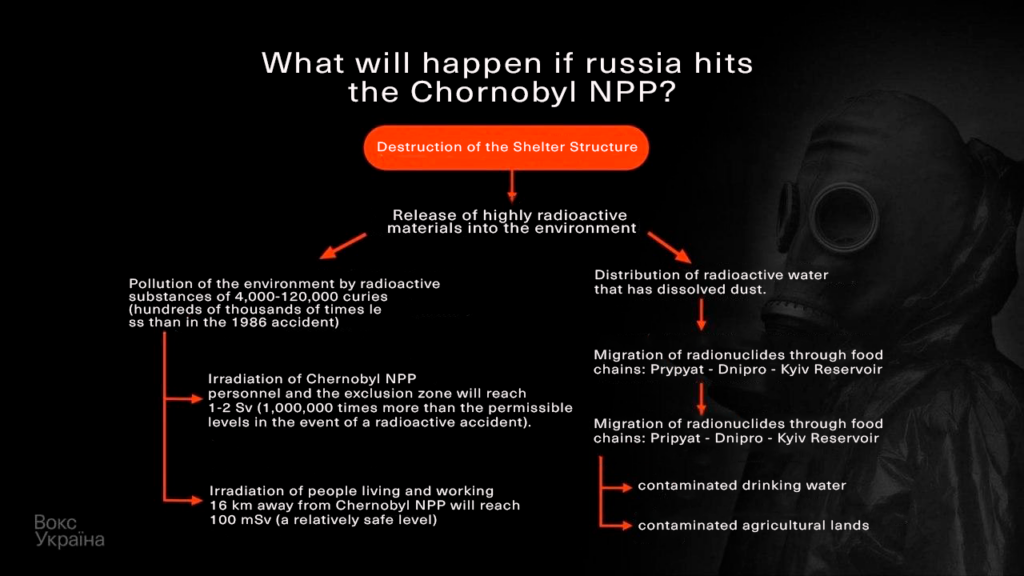
Russian occupiers completely de-energized the Chernobyl nuclear power plant. According to Energoatom, the Chernobyl station and all nuclear facilities in the Exclusion Zone were left without electricity. As a result, the Chernobyl nuclear power plant was at high risk of rising temperatures in the storage pools, forming hazardous vapor, and releasing radioactive substances into the environment. The winds could carry radioactive clouds to other areas across Ukraine, Belarus, Russia, and Europe.
Ventilation was not working at the nuclear power plant. Therefore, all personnel members could receive a dangerous radiation dose. Fortunately, the power engineers managed to restore energy supplies, but as long as the occupiers remain at the station, the risk of radioactive pollution remains very high.
In addition, on the night between 3 and 4 March, Russian occupation forces attacked Europe’s largest Zaporizhzhia nuclear power plant. Russian tankers aimed directly at the station and fired on one of the ZNPP’s power units causing a fire. They did not let SES units put out the fire. The occupiers also blew up ammunition at the ZNPP site.
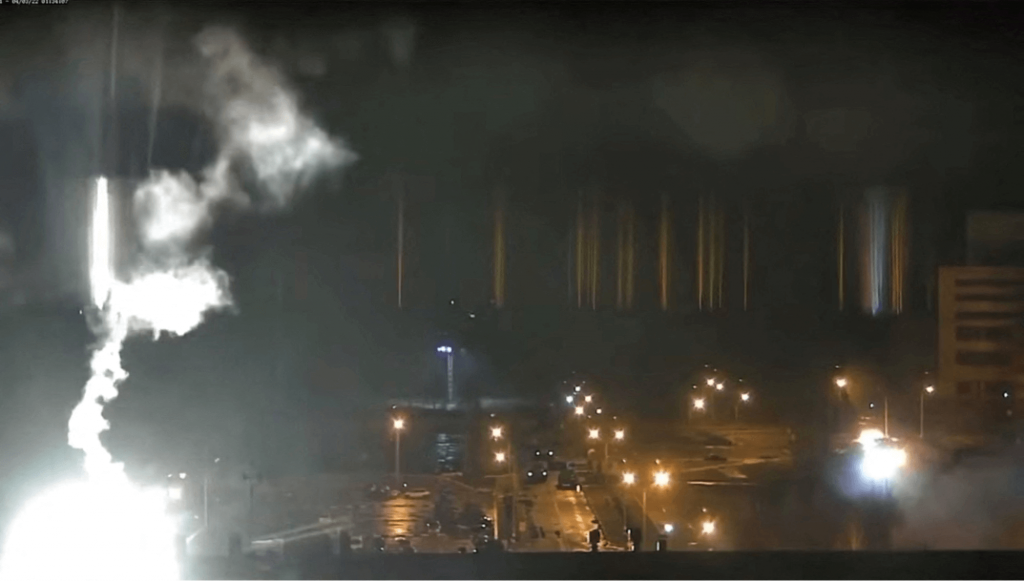
Source: Forbes Ukraine
In the event of an explosion at the ZNPP, the consequences might have been six times bigger than during the Chernobyl accident. In his speech, President Volodymyr Zelensky called such actions “terrorism of unprecedented levels.”
Firing shells at humanitarian convoys
Russists have repeatedly attacked humanitarian aid convoys headed for Ukrainian cities. For instance, Russian troops cynically used Grads to fire shells at a humanitarian convoy supposed to arrive in Mariupol. Because of this, the humanitarian corridor to Mariupol was canceled. Attempts at setting up a green corridor for the city and restoring the regime of silence failed.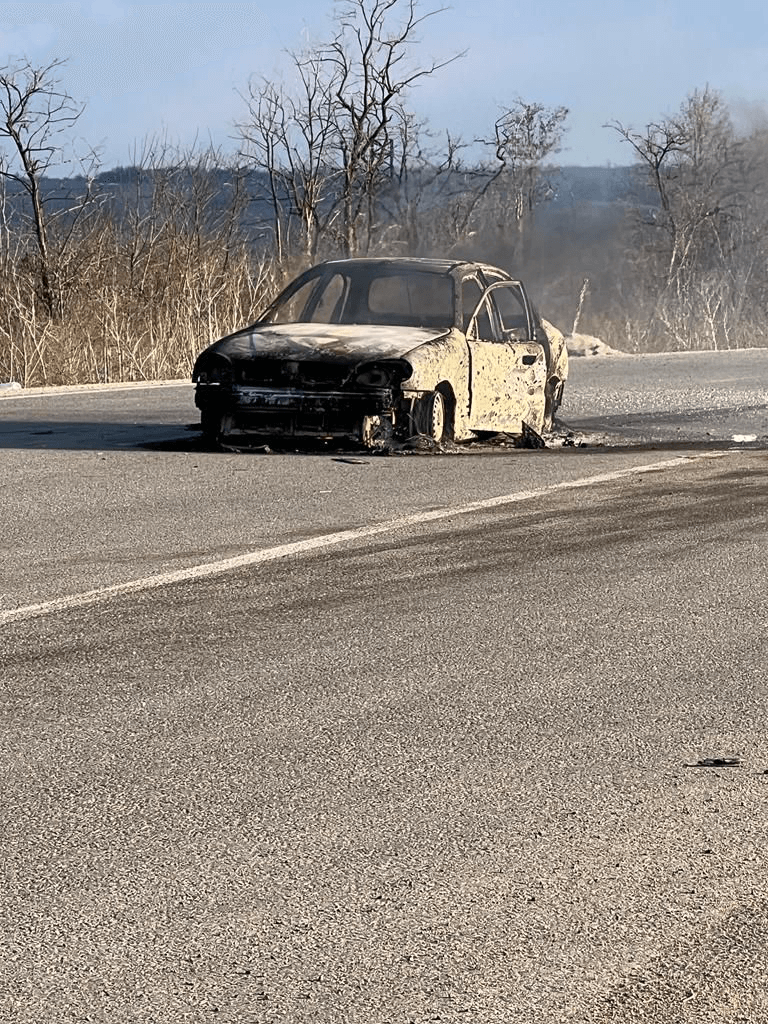
Source: Novynarnia
The shelling continued. Russian occupiers did not even let in the Red Cross, which was to help the population: in particular in the town of Shchastia (Luhansk region).
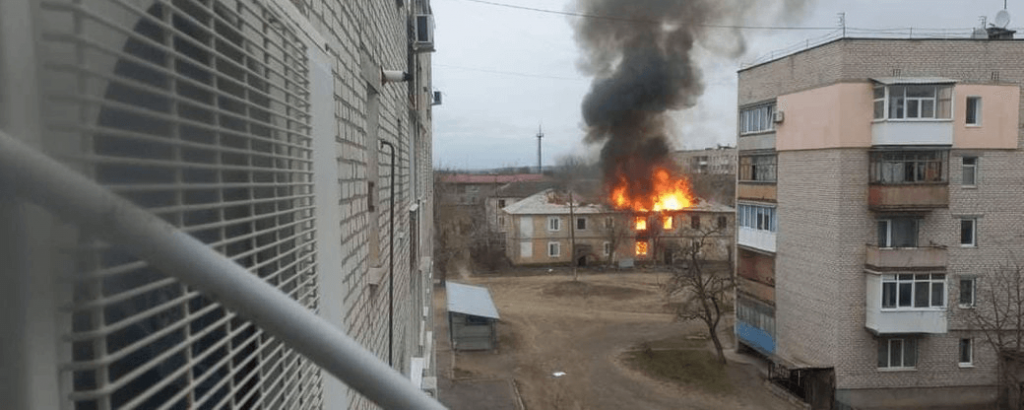
Source: UA:PBC
Conscription in the occupied territories
Russia commenced mobilization in the temporarily occupied territories of the Luhansk and Donetsk regions and occupied Crimea. One reason is that Russia began to be short of resources and forces to continue the offensive. In the temporarily occupied territories of the Donetsk region, the occupiers continue forced recruitment into the “1st Army Corps.” Most “recruits” are being sent to hot spots without proper training. They are forced to clear up the debris and dig trenches on the front lines. In addition, those forcibly drafted are hardly provided with anything, and they lack food.
According to intelligence reports, a point opened to release dead bodies of the “mobilized” residents of the occupied territories is operating in a Kopiyka store in temporarily occupied Luhansk. The “police” of the Russian occupation army is in charge of releasing bodies. Besides the documents, relatives only receive a death certificate and a burial permit. There are no documents specifying the place or circumstances of the “mobilized” persons’ deaths.
According to the Ministry of Defense’s Main Intelligence Directorate, russia does not pay compensation for those killed in these areas. The victims’ relatives are told they are not eligible for payment for the deaths of individuals “mobilized” from the “LPR/DPR,” even if they have Russian passports. And all this despite officials’ promises to pay 12 million rubles.
Russian officials must be immediately brought to international criminal accountability, and so must russia. Russia must be held to account for occupying Crimea and ORDLO and for the bloody aggressive war it treacherously started against the whole of Ukraine and the entire civilized world at 5 a.m. on February 24, 2022.
Vox Ukraine and Regional Center for Human Rights continue their work under martial law. Since the beginning of the war, the Vox Ukraine team has been fact-checking the news 24/7, debunking russia’s disinformation. We are also streaming Ukraine’s major victories: on the military, economic, diplomatic, and information fronts. In addition, we have launched the podcast “Wins.”
Attention
The author doesn`t work for, consult to, own shares in or receive funding from any company or organization that would benefit from this article, and have no relevant affiliations


